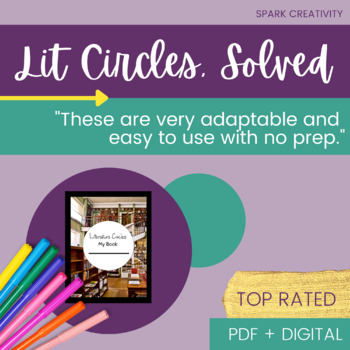Literature Circles Activity Set for Any Book l high school literature circles
- Zip
What educators are saying
Description
Literature circles are so promising. Giving students choice really helps inspire them to read. At the same time, traditional literature circles are prone to draaaaag.
Students aren't always prepared to dive in and lead their own discussion, even when assigned to the classic literature circles roles. It's no fun racing from group to group, trying to inspire good conversation with your teacherly presence.
That's why this literature circles unit for older kids skips the roles and the awkward silences.
Instead, you'll have six meeting days' worth of creative activities for your students to work on in their groups. They'll get choice over their books and creative ways to respond to them, and you'll get peace of mind during your literature circles unit. Finally.
Zip file: Google Drive + PDF Versions included.
What's inside:
- Clear suggestions for scheduling your unit over the course of about a month, including a book tasting, six meetings, a one-pagers gallery, lightning versions performance day, book trailer viewings and awards voting, and more.
- 6 Prep sheets to get students ready to succeed with each in-class activity, which will also serve as your chance to check that students did read
- 6 Unique Activities for your students to work on in class together: the open mind character analysis, book-inspired social media posts, the silent discussion (really!), one-pagers, lightning versions, and book trailers
- Easy rubric for grading the final project (book trailers to share with the class)
Check out the preview video for a quick tour through the full curriculum.
From the Reviews:
"I LOVED this resource. It has made planning this unit SO EASY. I just printed it out and went! I will definitely be using it again!"
"I absolutely love this resource! We started doing Lit Circles at the high school level 3 years ago and the lit circle worksheets were very elementary/middle schoolish. These worksheets are not like that at all."
"EXCELLENT resource! I really loved this tool and will use it again and again. Highly recommend purchasing this if you are starting out with Literature Circles.."
Questions? I've got answers! Shoot me an e-mail at betsy@nowsparkcreativity.com and I'll try to help.
You might also be interested in:
The Ed Deck: Lesson Planning Inspiration





